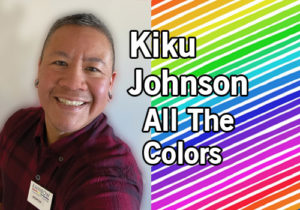There’s power in reclaiming the word ‘queer’
 CONCORD, CA (Jan. 25, 2022) — I never thought I would be associated with the word “queer” when I was coming of age in the Midwest in the ’70s and ’80s as a reluctant, girl-bodied person.
CONCORD, CA (Jan. 25, 2022) — I never thought I would be associated with the word “queer” when I was coming of age in the Midwest in the ’70s and ’80s as a reluctant, girl-bodied person.
I was a fan of many a sitcom and TV drama of the time, from “All in the Family,” “The Jeffersons,” “The Love Boat” and “Three’s Company” to “Dynasty” and “Miami Vice.” My culture and socialization came directly from my memorized TV Guide listings.
All of these shows portrayed queerness along gender and sexual attraction identities, and they were all debated, shunned, discouraged and shamed – informing what I believed and feared.
And as a Chinese and white mixed child, I wasn’t reflected anywhere onscreen. I was disappointed that all I was offered was David Carradine playing Kwai Chang Caine, the Shaolin monk in the 1970s series “Kung Fu.” I knew he was not like me.
There was also my discovery of the film “Breakfast at Tiffany’s,” where a beloved white actor played the Japanese character Mr. Yunioshi with eyes taped back, a fake tan and those buck teeth. It cut to the quick of my disbelief.
Then came the character Long Duk Dong in the movie “Sixteen Candles” and the other great offering for me in the ’80s with the feel-good film “Gung Ho.” Since I grew up around the Motor City of Detroit, it showed me that Americans can “accept” Asians – in this case, the strict Japanese culture of “efficiency and quality.” One must find humor and ridicule first, so we can then fall in love with the characters, despite their Asianess.
I was Asian living within a white community and knew I needed to land acceptance to survive. Let’s not complicate my experience too much with being queer as well. Or should I?
Intersectionality
Intersectionality was not a term until 1987, so I still had to choose a lane to move forward in. And my queerness was not visible like my Asianess, or was it?
The word queer first appeared in the English language in 1513 and has been intimated as being odd, not normal and peculiar. I grew up hearing the phrase “Queer as a $3 bill,” as counterfeit money was considered queer. When someone was ill, they may have said they “feel queer.”
As a kid who was bullied, I was targeted by the word queer. I didn’t understand then that being described as queer was connected to sexual connotations.
Many of us youngins in smaller towns in the ’80s did not have an understanding and conceptualization of sex. I knew from TV and film that queer was something directed toward men and that I definitely did not want that scarlet letter in addition to being Asian.
It’s a gift to live long enough to experience a word being reclaimed. Now when I watch TV, I see Amy Schneider on “Jeopardy,” Michaela Jae Rodriguez of “Pose” as the first transgender actor winning a Golden Globe, and the heroic humanity connecting intersections and culture on “Queer Eye.”
Without a doubt, I know now that queer means power, smart, possible, represented and leadership. The word queer has been revolutionized.
I am proud to identify as queer alongside of being Asian, as the same person. When stigmatized and marginalized groups reclaim a word, they reinvent our world.
Author bell hooks said: “Queer not as being about who you are having sex with, that can be a dimension of it, but queer as being about the self that is at odds with everything around it and has to invent and create and find a place to speak and to thrive and to live.”
Kiku Johnson is Rainbow Community Center’s executive director. Send questions and comments to kiku@rainbowcc.org.

Kiku Johnson
Kiku Johnson is Rainbow Community Center’s executive director. As a man of color and trans experience, Kiku has invested his life engaging and elevating youth and adult voices of marginalized intersectional identities. Send questions and comments to kiku@rainbowcc.org.
